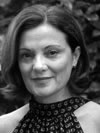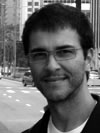HAU 3, April 23rd, 5:30 – 7.30 pm
Dance, Instruction and Cultural Engagement:
Two Reports from Santa
Catarina and Bahia
Moderator: Susanne Foellmer
Sandra Meyer and Antrifo Sanches study processes of instruction at the university level. From this perspective they define education as an activity of multiplicators in the cultural context of the cities of Florianópolis and Salvador.
 In
the Test Tube: Dance Experiments in Artistic Practice, Teaching and
Research.
In
the Test Tube: Dance Experiments in Artistic Practice, Teaching and
Research.
Sandra Meyer (Florianópolis) is a lecturer at the Center for Art at the State University of Santa Catarina (UDESC) and received her doctorate in 2006 in the field of Communication and Semiotics (PUC/São Paulo). She is the coordinator and curator of the Tubo de Ensaio – Corpo: Cena e Debate (Test Tube – Body: Stage and Discussion) project. She is the author of A Dança Cênica em Florianópolis (Dance on Stage in Florianópolis) (1994) and the co-author of “Tubo de Ensaio, experiências em arte e dança contemporânea” (Test Tube, Experiments in Art and Contemporary Dance) (2006) as well as “Coleção Dança Cênica – Pesquisas em Dança” (Series: Dance on Stage – Dance Research) (2008).
Without a memory and without its records no conscious continuity of facts can be established. Without the experiments of the present no new facts can be created. The city of Florianópolis’ history of dance on stage began in the 1950s, at first almost exclusively in ballet. In the 1980s modern and jazz dance influenced the dance scene. Since the 1990s, dance experiments have become increasingly prevalent with a contemporary and theoretical reference. For creative work, for education and research new perspectives are being won that are finding support within the structures and processes of the universities. In 2001 the project Tubo de Ensaio – Corpo: Cena e Debate (Test Tube – Body: Stage and Discussion) was founded in cooperation with the State University of Santa Catarina. The project makes meetings and experiments possible that move between the past and present with a great potential for the future. Scholars and the artists of the city share their knowledge and experience in equal parts.
 Processes
of Teaching and Learning in Dance: What Bodies Do We Develop (Educate)?
Processes
of Teaching and Learning in Dance: What Bodies Do We Develop (Educate)?
Antrifo Sanches (Salvador) is a professor at the School for Dance at the Federal University of Bahia (UFBA). He is a dancer, choreographer and producer. He studied dance education at the Folkwang University as well as performing arts at the UFBA. He is presently attaining his doctorate in the framework of a postgraduate program in the field of educational science.
The centuries-old and traditional practices of dance education are not always in direct contact with the paradigms of today’s educational methods. It is all the more important then that the field of dance addresses its teaching methods. Otherwise dance education will risk being completely separated from its artistic context. As a teacher at the School of Dance at the Federal University of Bahia, the lecturer investigates the development and education of dancing bodies and searches for educational practices for professional dancers. Dance education should not have the reproduction of a canon as its goal. How can one communicate the instruments dancers need in the educational process, so that they can actively partake in the world in which they move? What pedagogic processes are in touch with the ideas of today’s world?

